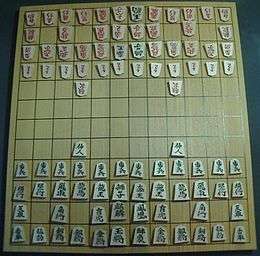Micro shogi

Microshogi (五分摩訶将棋 gofun maka shōgi "5-minute (scarlet) poppy chess") is a modern variant of shogi (Japanese chess), with very different rules for promotion, and demotion. Kerry Handscomb of NOST[note 1] gave it this English name. Although not confirmed, he credits its invention to the late Oyama Yasuharu, a top level shogi player. The game was invented before 1982.
Equipment
Two players play on a board ruled into a grid of 5 ranks (rows) by 4 files (columns). The squares are undifferentiated by marking or color.
Each player has a set of 5 wedge-shaped pieces. The pieces are of slightly different sizes. From largest to smallest (or most to least powerful) they are:
- 1 king
- 1 bishop
- 1 gold general
- 1 silver general
- 1 pawn
Game rules
The game is identical to standard shogi with the following exceptions.
Setup
|
|
Each side places his pieces in the following positions, pointing toward the opponent. For more information see the ChessVariants.com page on micro shogi.
- In the rank nearest the player:
- The king is placed in the right corner
- The bishop is placed in the adjacent file to the king.
- The gold general is placed adjacent to the bishop.
- The silver general is placed adjacent to the gold general in the left corner.
That is, the first rank is |S|G|B|K|.
- In the second rank, each player places the pawn in the same file as the king.
Promotion
Unlike standard shogi, microshogi has no promotion zone. Instead, a piece promotes when it captures, and promotion is mandatory. When a promoted piece captures, it demotes—that is, it is flipped back over to show its original unpromoted value.
Promotion values are entirely different from standard shogi:
- A king does not promote: K
- A silver general becomes a lance and vice versa: S ↔ L
- A bishop becomes a tokin (T) and vice versa: B ↔ T
- A gold general becomes a rook and vice versa: G ↔ R
- A pawn becomes a knight and vice versa: P ↔ N
Thus when a lance, tokin, rook, or knight makes a capture, it reverts to its former state.
A knight which reaches one of the two far ranks is trapped, as is a pawn which captures and thus promotes there. Likewise, a pawn that reaches the far rank is trapped, as is a knight which captures there. A lance is also trapped at the far rank, but can escape if it captures there and thus demotes to a silver. A silver which captures in the far rank and therefore promotes to a lance is trapped.
Any trapped piece may be captured and returned to play as part of the opposing army.
A tokin moves the same way as a golden general.
Drops
Drops are similar to standard shogi, except that:
- A player may drop a piece with either side facing up.
- There are no restrictions when dropping pawns. That is, a player may have two unpromoted pawns on the same file, a piece can be dropped with no legal moves later, and a pawn can be dropped to give immediate checkmate.
See also
Notes
- ↑ NOST (kNights Of the Square Table), a (now defunct) correspondence game club formed in 1960 by Bob Lauzon and Jim France, enjoyed several hundred active members.
